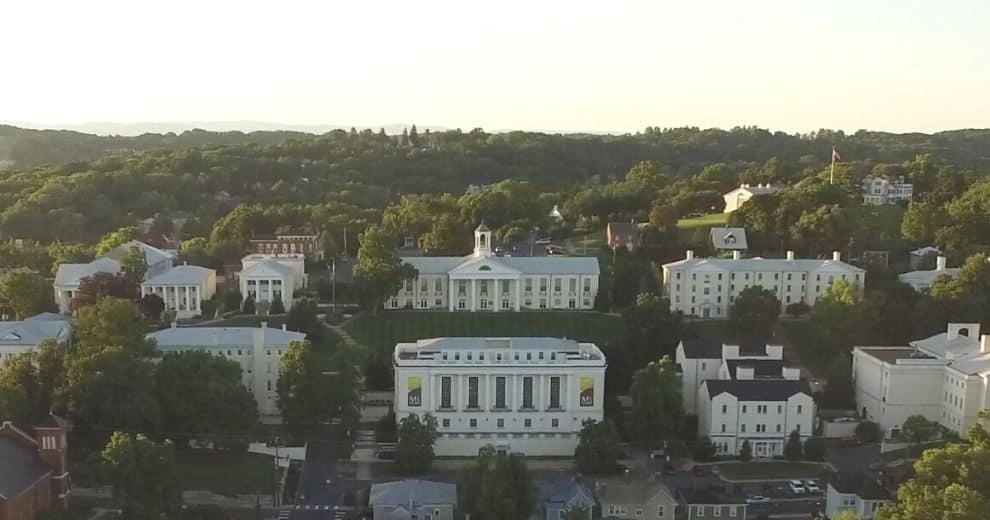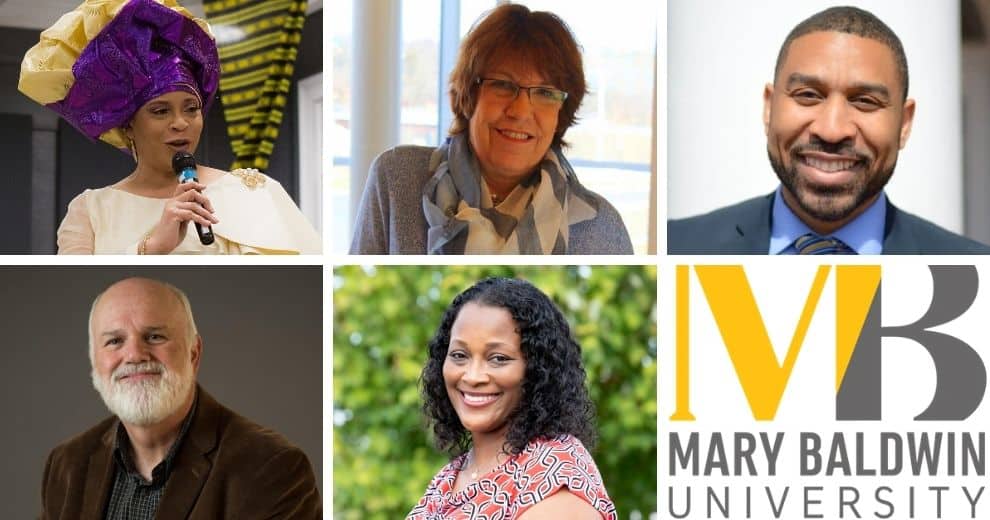Mary Baldwin University has recently formed a Coalition for Social Justice to address pressing issues of social justice and racial inequality looking forward to the 2020–21 academic year and beyond.
“We acknowledge that our students will return to campus changed, and that we are changed, both from the pandemic and from the cries for reform and justice following the deaths of George Floyd and so many others,” said President Pamela R. Fox, who announced the impetus behind the coalition during an MBU town hall meeting last month. “This is an urgent moment, and we seek to immediately identify areas of focus through the Coalition for Social Justice that will foster a more inclusive environment with open avenues for dialogue and for action.”

Five faculty and staff members have agreed to serve as co-leaders of the coalition, making recommendations, organizing community-based action, and guiding the evolution of this university-wide priority:
- Andrea Cornett-Scott, associate provost for inclusive excellence
- Deborah Diaz, associate professor, physical therapy doctoral program
- Darren Jones, associate vice president of student engagement
- Roderic Owen, professor of philosophy
- Amy Tillerson-Brown, professor of history
Forming the coalition is the starting point for a broad effort that aims to involve the entire MBU community in tackling issues like systemic discrimination, racial inequality, and the legacy of slavery.
“From our initial meetings, it is clear that we read the charge as more than an opportunity to hold discussions about race and social inequality,” said Cornett-Scott, “the team is really looking at how to dismantle systemic racism and how to create a truly inclusive community.”
As the university faces the urgency of the current moment, vital perspectives will come from the diverse and engaged MBU student body which has over 50% representation of people of color.
One of the coalition’s most immediate goals is to engage students in meaningful dialogue about social justice, race, and equity.
“The university’s mantra ‘we put students first, always’ is of the utmost importance in the work of the coalition,” said Jones. “We will engage students throughout the process by creating safe spaces for them to share their experiences and ideas, amplifying their voices, centering the voices of marginalized groups, and creating opportunities to receive ongoing feedback and insight so we can continually demonstrate our commitment to cultivating and sustaining an inclusive campus community.”

Coalition for Social Justice co-leaders (top row, l-r) Andrea Cornett-Scott, associate provost for inclusive excellence; Deborah Diaz, associate professor, physical therapy doctoral program; Darren Jones, associate vice president of student engagement; (bottom row, l-r) Roderic Owen, professor of philosophy; and Amy Tillerson-Brown, professor of history.
The university-wide effort for social justice, spearheaded by the coalition, will increase the value of an MBU education for students, further instilling inclusive, forward-looking leadership.
The coalition plans to jumpstart the process for faculty and students to use coursework to critically explore assumptions, reflect upon biases, and confront misunderstandings — leading to more transparent dialogue, respect for differences, and a desire to act for racial justice and equity. They are also researching anti-bias and other training opportunities for faculty and staff so that they are best able to support students inside and outside of the classroom.
In addition to preparing for students’ return this fall, the coalition has identified three overarching areas of focus to lay a foundation for the work ahead:
- Historical legacies: research and evaluate MBU’s 178-year history regarding institutional culture and climate through the lenses of race, equity, and social justice
- Inclusive educational experience: examine curriculum, co-curricular activities, and teaching practices to integrate racial justice equity that prepares MBU students to be culturally competent leaders
- University and community: examine MBU’s relationship with the Staunton region to establish the university as a model and resource for community engagement and racial healing
“MBU is connected to Staunton, Waynesboro, Augusta County, and beyond not only through internships, faculty consultancies, and professional networks, but also in our efforts to support and build a just and caring community through service and outreach,” Owen said. “The coalition seeks to continue to explore and create ways in which we can pool our moral and practical resources — not only to confront hatred, discrimination, and the scourge of racism — but also to expand how we effectively teach and learn about equity, diversity, and social justice both on and off this college campus.”
University leadership and members of the Mary Baldwin Board of Trustees are actively supporting the coalition throughout the summer and fall, and Fox and other Trustees have also contributed a budget to aid their work.
Students, faculty, and staff: Share your thoughts
Message from the Coalition for Social Justice:
It is important for us to gauge how our faculty, staff, and students perceive our campus racial climate. In addition, we want to know your ideas on ways Mary Baldwin can demonstrate its commitment to equity, inclusion, and social justice.
Please complete the following survey by August 10, 2020 to help us develop coalition programming goals. Respondents will have the opportunity to win a gift card!
If you have any questions, you can contact coalition@marybaldwin.edu.